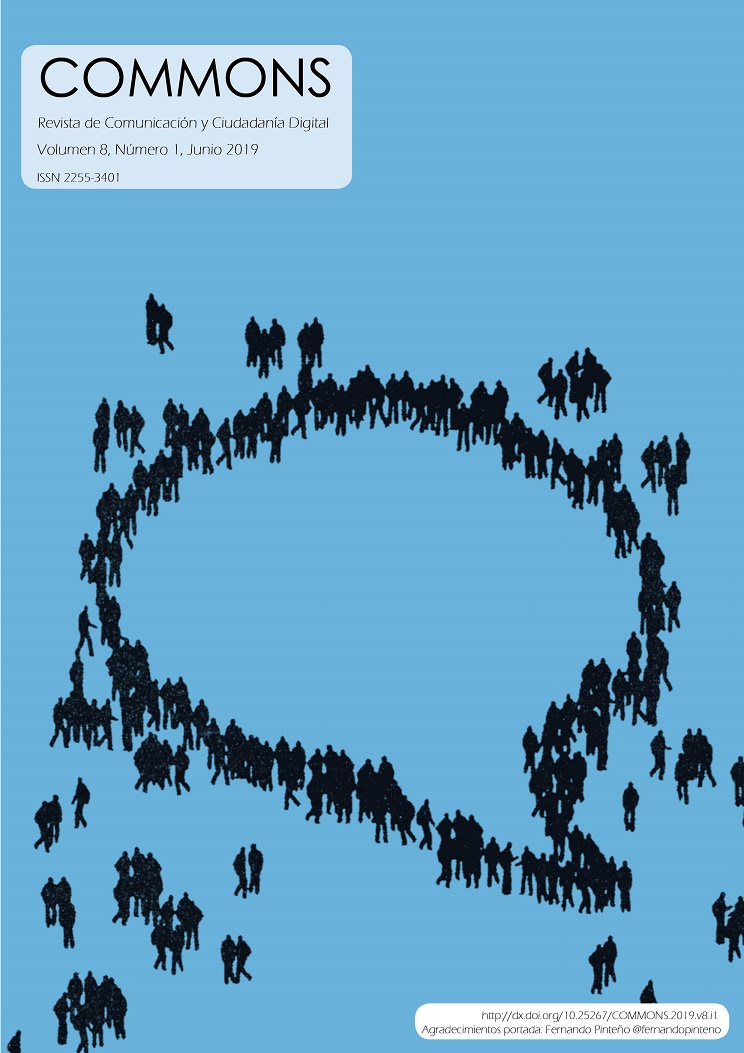Marco analítico para el aprovechamiento de Tecnologías de Información y Comunicación. / Analytical Framework for the Use of Information and Communication Technologies.
Diagnóstico en organizaciones gubernamentales y de la sociedad civil en México / Diagnosis in Government and Civil Society Organizations in Mexico

Info
Abstract
The objective of this paper is to propose an analytical framework for the use of ICT in governmental and civil society organizations for social development, which was integrated through the review of previous studies and surveys. Data from an online survey applied to 203 mexican organizations focused on the development of young people were analyzed based on this framework. The findings show the level of use of ICT in relation to three levels of use (basic, intermediate and high) and 11 dimensions. It is found that the use of ICTs is mainly for administrative and dissemination purposes and to a lesser extent to enhance their capacities to respond to the social problems they address. This study generates knowledge about these organizations which are key actors for development and social change. Addtionally, this proposal is replicable in other organizations and contexts.
Keywords
Downloads
How to Cite
License
Authors who have published with this journal accept the following terms:
- Authors shall retain their copyright and guarantee the journal the right of first publication of their work, which shall simultaneously be subject to the Creative Commons 3.0 Recognition License, which allows third parties to share the work as long as its author and first publication are indicated in this journal.
- Authors may adopt other non-exclusive licensing agreements for the distribution of the published version of the work (e.g., depositing it in an institutional telematic archive or publishing it in a monographic volume) provided that the initial publication in this journal is indicated.
- Authors are permitted and encouraged to disseminate their work via the Internet (e.g., in institutional telematic archives or on their website) before and during the submission process, which may lead to interesting exchanges and increased citations of the published work. (See The Effect of Open Access).
References
ASOCIACIÓN DE INTERNET.MX/INFOTEC. (mayo de 2018). Estudio sobre los Hábitos de los Usuarios de Internet en México 2017 (13º). Recuperado de https://www.infotec.mx/work/models/infotec/Resource/1012/6/images/Estudio_Habitos_Usuarios_2017.pdf
ATTOUNI, M. A. K., & MUSTAFFA, C. S. (2014). How do non-profit organizations in Libya adopt and use social media to communicate with the society?. Procedia- Social and Behavioral Sciences, (155), 92-97. doi: 10.1016/j.sbspro.2014.10.262
CAMACHO, K. (2003). Internet, ¿cómo vamos cambiando?. San José de Costa Rica: Fundación Acceso.
CATALANO, R. F., BERGLUND, M. L., RYAN, J. A., LONCZAK, H. S. & HAWKINS, J. D. (2004). Positive youth development in the United States: Research findings on evaluations of positive youth development programs. The ANNALS of the American Academy of Political and Social Science, 591(1), 98-124. doi:10.1177/0002716203260102
CORONA, S. (2013, 3, abril). Críticas en México a la política de Peña Nieto hacia los jóvenes. El País. Recuperado de https://elpais.com/internacional/2013/04/03/actualidad/1364955683_507552.html
DE SILVA, N. (2016). Exploring the use of ICTs in non-profit sector organisations: supporting the third act (Tesis doctoral). University of Wellington, Nueva Zelanda. Recuperado de https://researcharchive.vuw.ac.nz/xmlui/bitstream/handle/10063/5297/thesis.pdf?sequence=1
DURAND, B. (2017). Ninis: factores determinantes. Realidad, datos y espacio. Revista Internacional de Estadística y Geografía, 8(3), 46-72.
EL COLEGIO DE MÉXICO. (2018). Red de Estudios sobre Desigualdades. Desigualdades en México/2018. Recuperado de https://desigualdades.colmex.mx/informe-desigualdades-2018.pdf
ENZ, A., FRANCO, V. & SPAGNUOLO, V. (2012). Manual de comunicación para organizaciones sociales: hacia una gestión estratégica y participativa. Argentina: Comunia.
FINQUELIEVICH, S., & KISILEVSKY, G. (2005). La sociedad civil en la era digital: Organizaciones comunitarias y redes sociales sustentadas por TIC en Argentina (Documento de trabajo nº 41). Argentina: Universidad de Buenos Aires. Recuperado de http://lanic.utexas.edu/project/laoap/iigg/dt41.pdf
INSTITUTO NACIONAL DE ESTADÍSTICA E INFORMÁTICA (INEI). (2007). Encuesta sobre Tecnologías de la Información y Comunicaciones. Recuperado de http://www.cepal.org/socinfo/noticias/paginas/6/35876/PeruEMPRESAS.pdf
INSTITUTO NACIONAL DE ESTADÍSTICA Y GEOGRAFÍA (INEGI). (2017). Estadísticas sobre disponibilidad y uso de tecnología de información y comunicaciones en los hogares, ENDUTIH. México: INEGI. Recuperado de http://www.beta.inegi.org.mx/programas/dutih/2017/
INSTITUTO NACIONAL DE TRANSPARENCIA, ACCESO A LA INFORMACIÓN Y PROTECCIÓN DE DATOS PERSONALES (INAI). (2018). ¿Qué es el INAI? Recuperado de: http://inicio.inai.org.mx/SitePages/que-es-el-inai.aspx
KLEINE, D. (2013). Technologies of choice: ICTs, development and capabilities approach. Estados Unidos: MIT Press.
LIZARRAGA, G. (2004). Organizaciones civiles y gobierno: un eslabón estratégico en la transición. Estudios Fronterizos, 5(10), 51-72.
MONTESINOS-LÓPEZ, O. A., LUNA-ESPINOZA, I., HERNÁNDEZ-SUÁREZ, C. M. & TINOCO-ZERMEÑO, M. A. (2019). Muestreo estadístico. Tamaño de muestra y estimación de parámetros. Universidad de Colima: México.
NEGRETE, R. & LEYVA, G. (2013). Los Ninis en México: una aproximación crítica a su medición. Realidad, datos y espacio. Revista Internacional de Estadística y Geografía, 4(1), 90-121.
NUGROHO, Y. (2011). Opening the black box: The adoption of innovations in the voluntary sector—The case of Indonesian civil society organizations. Research Policy, 40(5), 761-777. doi: 10.1016/j.respol.2011.03.002
ORGANIZACIÓN DE LAS NACIONES UNIDAS (ONU). (2010). Why are ICTs important for Civil Society Organizations?. Recuperado de: http://www.un.org/ esa/socdev/ngo/docs/2010/directory/ictcso.pdf
ORGANIZACIÓN PARA LA COOPERACIÓN Y DESARROLLO ECONÓMICOS (OCDE). (2018). Getting it Right: Prioridades estratégicas para México. Recuperado de http//dx.doi.org/10.1787/9789264292871-es
PALOS, M. & MÉNDEZ, E. (2011). Las organizaciones sin fines de lucro en México. Un análisis crítico sobre los actuales efectos de su gestión. En M. Cano & J. Ortiz. (Coords.), Contabilidad, autoría y fiscal. Mesa llevada a cabo en el Congreso Internacional de Investigación en Ciencias Administrativas. Veracruz: México.
RAMOS, H. (2015). Información y ciudadanía, una propuesta desde la gobernanza. Investigación Bibliotecológica: Archivonomía, Bibliotecología e Información, 29(67), 113-140. doi: https://doi.org/10.1016/j.ibbai.2016.02.039
REGUILLO, R. (2012). Culturas juveniles. Formas políticas del desencanto. Buenos Aires: Siglo Veintiuno.
REYGADAS, R. (2005). Aportes de la sociedad civil al desarrollo local en México. Revista Futuros, 3(11), 1-9. Recuperado de http://www.asocam.org/sites/default/files/publicaciones/files/4fc8d4751ef6284a77c3bab86f8427d6.pdf
SEN, A. (2000). Desarrollo y libertad. Barcelona: Planeta.
TUFTE, T. (2015). Comunicación para el cambio social. La participación y el empoderamiento como base para el desarrollo mundial. Barcelona: Icaria.
WALSHAM, G. (2017). ICT4D research: Reflections on history and future agenda. Information Technology for Development, 23(1), 18-41. doi: https://doi.org/10.1080/02681102.2016.1246406
WORLD SUMMIT ON THE INFORMATION SOCIETY (WSIS). (2018). Recuperado de https://www.itu.int/net4/wsis/forum/2018/


